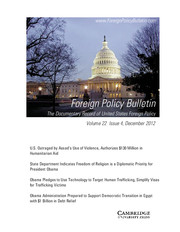Editorial Comments
EDITOR’S NOTE
Since the last issue of FPB, a tsunami of financial crisis has broken across the world. International finance has been a crucial element of U.S. foreign policy for many decades, but in the next few years, it will probably be more important than at any time since the second World War. The drift to protectionism, the flows of capital and sudden shifts in exchange rates, and the drying up of global credit flows will affect relations among the U.S., Europe, China, and Japan; the collapse of commodity prices will affect relations with Russia, Argentina, and the oil-producing nations; and the international banking crisis will affect overextended countries from Iceland, Spain, and Ireland to Mexico.
Newly-inaugurated President Obama thus faces an extreme global financial crisis, along with ongoing wars in Iraq and Afghanistan, as crucial foreign policy legacies of the Bush administration. There have already been international meetings and declarations addressing the crisis, which we will cover in future issues. It is being argued that these challenges may prove a fatal test for the international financial machinery developed at Bretton Woods in the aftermath of World War II, requiring new international agreements and treaties to restore global financial confidence. I expect that many of the documents appearing in future issues of FPB will seek to offer solutions, whether from the perspective of U.S. policy-makers or from other nations and international organizations.
In crucial times like these, FPB will be preserving the key records of change, allowing scholars and interested readers to trace the development of international financial policies and their effects. Look for our expanded coverage of international finance in future issues.
Jack A. Goldstone, Editor
Kevin J. Fandl, Managing Editor
MISSION STATEMENT
The Foreign Policy Bulletin is a reference periodical published quarterly by Cambridge University Press. Its purpose is to make available a timely and systematic record of United States foreign policy.
In addition to major addresses, statements, and other public reports and remarks of the President, Secretary of State, and Administration officials in other foreign affairs agencies, the Foreign Policy Bulletin includes excerpts from pivotal debates in the Congress; speeches and other statements by foreign and international officials; relevant texts and reports from international organizations; summaries and listings of treaties and other agreements to which the United States is a party; and other information of particular interest to the study of U.S. foreign relations.
The Foreign Policy Bulletin is not affiliated with any government or international institution, and has complete editorial autonomy.
Each issue has a name and subject index as well as a list of documents. There is an annual index at the end of each volume.
INDEXING: Included in the PAIS (Public Affairs Information Service) indexes: the PAIS Bulletin, PAIS on CD-Rom, and online through Dialog, BRS, and Data Star.


